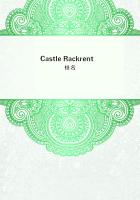Along the bulwarks victory-trophies hung Countless. With garlands wreathed they all the ships, Their heads, the spears, the shields wherewith they had fought Against their foes. The chiefs stood on the prows, And poured into the dark sea once and again Wine to the Gods, to grant them safe return.
But with the winds their prayers mixed; far away Vainly they floated blent with cloud and air.
With anguished hearts the captive maids looked back On Ilium, and with sobs and moans they wailed, Striving to hide their grief from Argive eyes.
Clasping their knees some sat; in misery some Veiled with their hands their faces; others nursed Young children in their arms: those innocents Not yet bewailed their day of bondage, nor Their country's ruin; all their thoughts were set On comfort of the breast, for the babe's heart Hath none affinity with sorrow. All Sat with unbraided hair and pitiful breasts Scored with their fingers. On their cheeks there lay Stains of dried tears, and streamed thereover now Fresh tears full fast, as still they gazed aback On the lost hapless home, wherefrom yet rose The flames, and o'er it writhed the rolling smoke.
Now on Cassandra marvelling they gazed, Calling to mind her prophecy of doom;
But at their tears she laughed in bitter scorn, In anguish for the ruin of her land.
Such Trojans as had scaped from pitiless war Gathered to render now the burial-dues Unto their city's slain. Antenor led To that sad work: one pyre for all they raised.
But laughed with triumphing hearts the Argive men, As now with oars they swept o'er dark sea-ways, Now hastily hoised the sails high o'er the ships, And fleeted fast astern Dardania-land, And Hero Achilles' tomb. But now their hearts, How blithe soe'er, remembered comrades slain, And sorely grieved, and wistfully they looked Back to the alien's land; it seemed to them Aye sliding farther from their ships. Full soon By Tenedos' beaches slipt they: now they ran By Chrysa, Sminthian Phoebus' holy place, And hallowed Cilla. Far away were glimpsed The windy heights of Lesbos. Rounded now Was Lecton's foreland, where is the last peak Of Ida. In the sails loud hummed the wind, Crashed round the prows the dark surge: the long waves Showed shadowy hollows, far the white wake gleamed.
Now had the Argives all to the hallowed soil Of Hellas won, by perils of the deep Unscathed, but for Athena Daughter of Zeus The Thunderer, and her indignation's wrath.
When nigh Euboea's windy heights they drew, She rose, in anger unappeasable Against the Locrian king, devising doom Crushing and pitiless, and drew nigh to Zeus Lord of the Gods, and spake to him apart In wrath that in her breast would not be pent:
"Zeus, Father, unendurable of Gods Is men's presumption! They reck not of thee, Of none of the Blessed reck they, forasmuch As vengeance followeth after sin no more;
And ofttimes more afflicted are good men Than evil, and their misery hath no end.
Therefore no man regardeth justice: shame Lives not with men! And I, I will not dwell Hereafter in Olympus, not be named Thy daughter, if I may not be avenged On the Achaeans' reckless sin! Behold, Within my very temple Oileus' son Hath wrought iniquity, hath pitied not Cassandra stretching unregarded hands Once and again to me; nor did he dread My might, nor reverenced in his wicked heart The Immortal, but a deed intolerable He did. Therefore let not thy spirit divine Begrudge mine heart's desire, that so all men May quake before the manifest wrath of Gods."
Answered the Sire with heart-assuaging words:
"Child, not for the Argives' sake withstand I thee;
But all mine armoury which the Cyclops' might To win my favour wrought with tireless hands, To thy desire I give. O strong heart, hurl A ruining storm thyself on the Argive fleet."
Then down before the aweless Maid he cast Swift lightning, thunder, and deadly thunderbolt;
And her heart leapt, and gladdened was her soul.
She donned the stormy Aegis flashing far, Adamantine, massy, a marvel to the Gods, Whereon was wrought Medusa's ghastly head, Fearful: strong serpents breathing forth the blast Of ravening fire were on the face thereof.
Crashed on the Queen's breast all the Aegis-links, As after lightning crashes the firmament.
Then grasped she her father's weapons, which no God Save Zeus can lift, and wide Olympus shook.
Then swept she clouds and mist together on high;
Night over earth was poured, haze o'er the sea.
Zeus watched, and was right glad as broad heaven's floor Rocked 'neath the Goddess's feet, and crashed the sky, As though invincible Zeus rushed forth to war.
Then sped she Iris unto Acolus, From heaven far-flying over misty seas, To bid him send forth all his buffering winds O'er iron-bound Caphereus' cliffs to sweep Ceaselessly, and with ruin of madding blasts To upheave the sea. And Iris heard, and swift She darted, through cloud-billows plunging down -- Thou hadst said: "Lo, in the sky dark water and fire!"
And to Aeolia came she, isle of caves, Of echoing dungeons of mad-raging winds With rugged ribs of mountain overarched, Whereby the mansion stands of Aeolus Hippotas' son. Him found she therewithin With wife and twelve sons; and she told to him Athena's purpose toward the homeward-bound Achaeans. He denied her not, but passed Forth of his halls, and in resistless hands Upswung his trident, smiting the mountain-side Within whose chasm-cell the wild winds dwelt Tempestuously shrieking. Ever pealed Weird roarings of their voices round its vaults.
Cleft by his might was the hill-side; forth they poured.
He bade them on their wings bear blackest storm To upheave the sea, and shroud Caphereus' heights.















